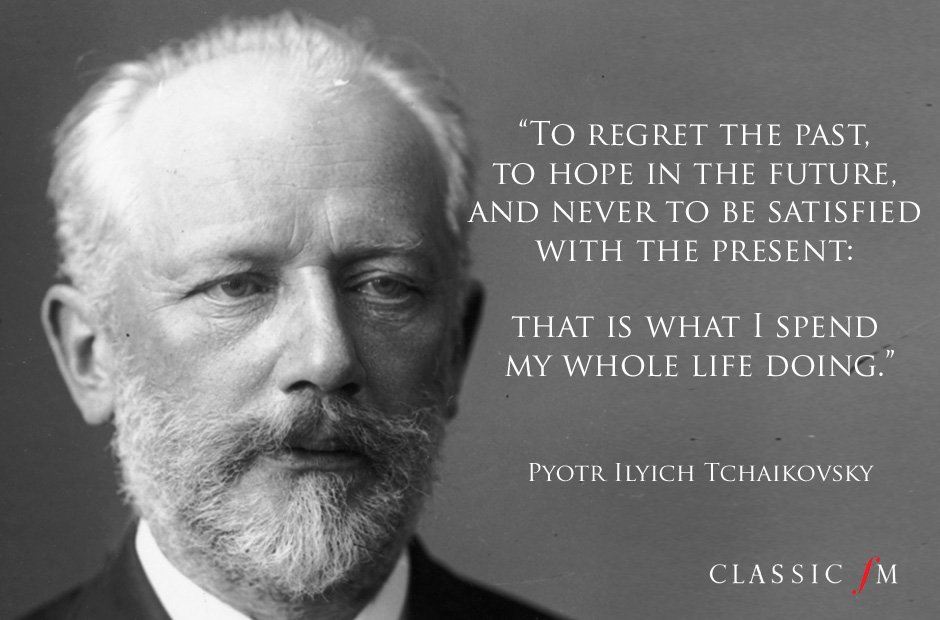"Regrets, I've Had A Few." This American Life
("Act One" Is Outstanding)
BY MARIA POPOVA
 “An artist needs a certain amount of turmoil and confusion,” Joni Mitchell once told an interviewer. Indeed, the history of the arts is the history of the complex relationship between creativity and mental illness. But while psychologists have found that a low dose of melancholy enhances creativity, its clinical extreme in depression can be creatively debilitating.
“An artist needs a certain amount of turmoil and confusion,” Joni Mitchell once told an interviewer. Indeed, the history of the arts is the history of the complex relationship between creativity and mental illness. But while psychologists have found that a low dose of melancholy enhances creativity, its clinical extreme in depression can be creatively debilitating.
Few artists have walked that fine line with more tenacity and self-awareness than the great Russian composer Pyotr Ilyich Tchaikovsky (May 7, 1840–November 6, 1893). Frequently throughout his correspondence with family and friends, collected in The Life and Letters of Pyotr Ilyich Tchaikovsky (public library;public domain) — the source of his enduring ideas on work ethic vs. inspiration, the paradox of client work, and why you should never allow interruptions in your creative process — Tchaikovsky notes his cyclical lapses into depression, undergirded by a dogged dedication to looking for beauty and meaning amid the spiritual wreckage. This intimate tango of sadness and radiance is ultimately what gives his music its timeless edge in penetrating the soul.
In a letter from the spring of 1870, shortly after his thirtieth birthday, Tchaikovsky writes:
I am sitting at the open window (at four a.m.) and breathing the lovely air of a spring morning… Life is still good, [and] it is worth living on a May morning… I assert that life is beautiful in spite of everything! This “everything” includes the following items: 1. Illness; I am getting much too stout, and my nerves are all to pieces. 2. The Conservatoire oppresses me to extinction; I am more and more convinced that I am absolutely unfitted to teach the theory of music. 3. My pecuniary situation is very bad. 4. I am very doubtful if Undine will be performed. I have heard that they are likely to throw me over.In a word, there are many thorns, but the roses are there too.
Even though Tchaikovsky frequently lamented his “wearing, maddening depression,” perhaps most remarkable yet quintessentially human about his disposition was the ability to assure his loved ones of the very things he was unable to internalize himself — for who among us hasn’t found that it is far easier to offer light to our dearest humans in situations that leave our own inner worlds shrouded in impenetrable darkness?
In the fall of 1876, Tchaikovsky consoles his beloved nephew through a period of dejection and melancholy:
Probably you were not quite well, my little dove, when you wrote to me, for a note of real melancholy pervaded your letter. I recognized in it a nature closely akin to my own. I know the feeling only too well. In my life, too, there are days, hours, weeks, aye, and months, in which everything looks black, when I am tormented by the thought that I am forsaken, that no one cares for me. Indeed, my life is of little worth to anyone. Were I to vanish from the face of the earth to-day, it would be no great loss to Russian music, and would certainly cause no one great unhappiness. In short, I live a selfish bachelor’s life. I work for myself alone, and care only for myself. This is certainly very comfortable, although dull, narrow, and lifeless. But that you, who are indispensable to so many whose happiness you make, that you can give way to depression, is more than I can believe. How can you doubt for a moment the love and esteem of those who surround you? How could it be possible not to love you? No, there is no one in the world more dearly loved than you are. As for me, it would be absurd to speak of my love for you. If I care for anyone, it is for you, for your family, for my brothers and our old Dad. I love you all, not because you are my relations, but because you are the best people in the world.
The Life and Letters of Pyotr Ilyich Tchaikovsky remains a wonderful and abidingly rewarding read in its entirety. Complement this particular fragment with Charles Dickens’s beautiful missive of consolation to his bereaved sister and E.B. White’s assuring letter to a man who had lost faith in life.


No comments:
Post a Comment